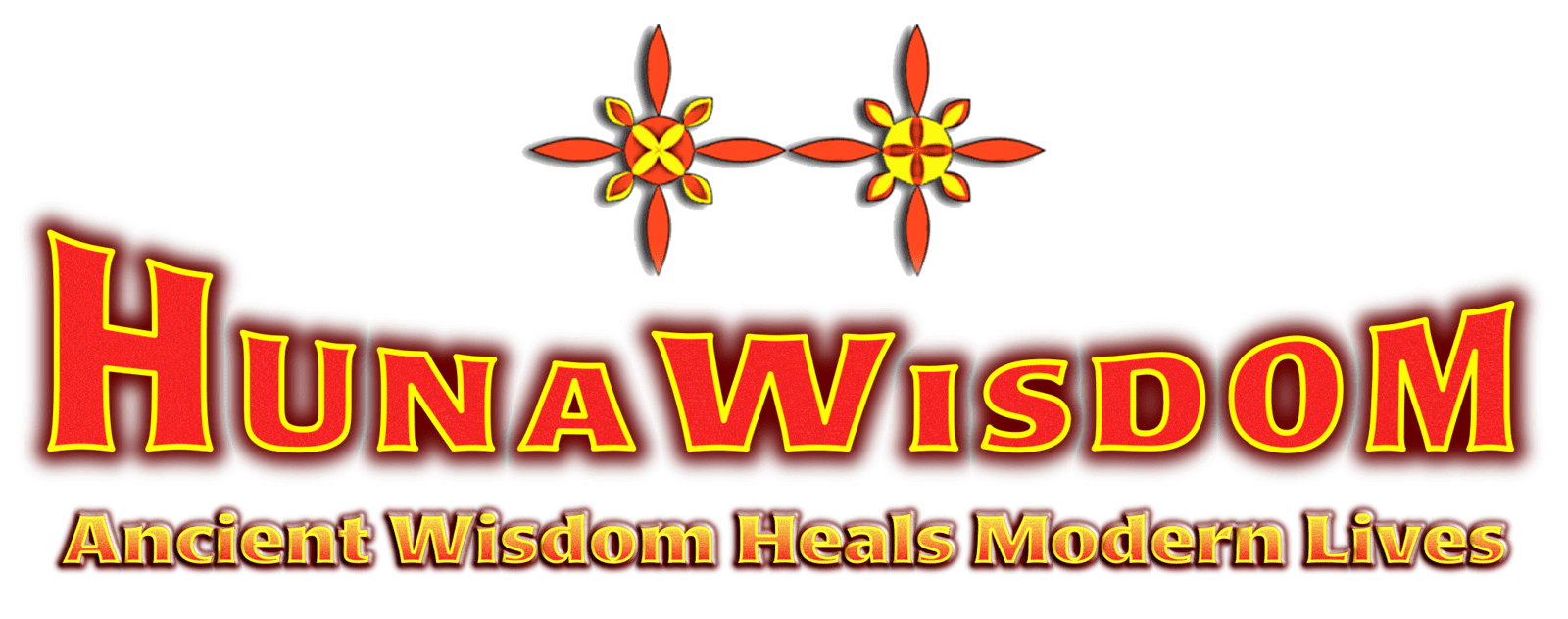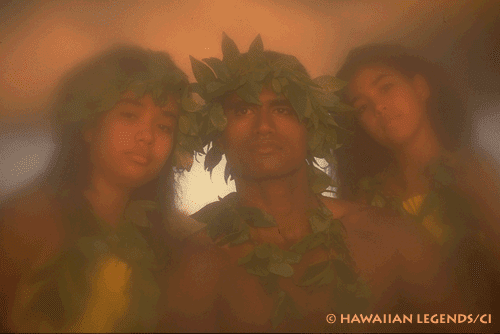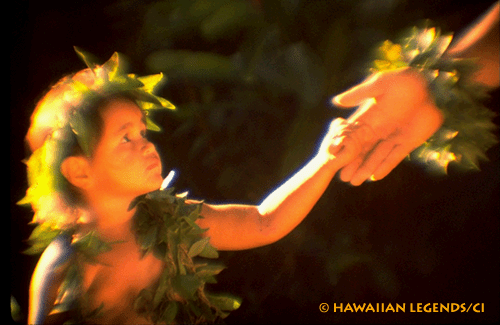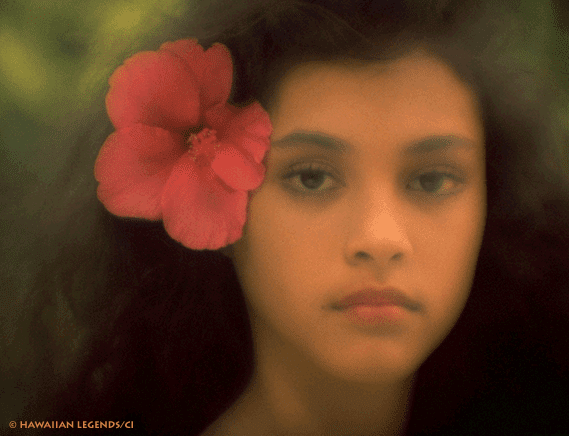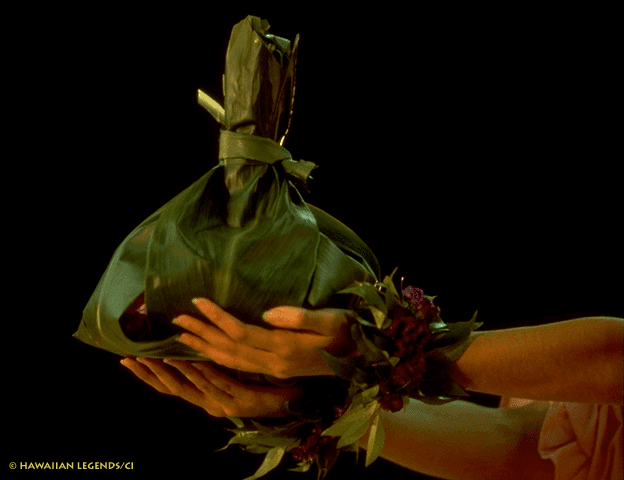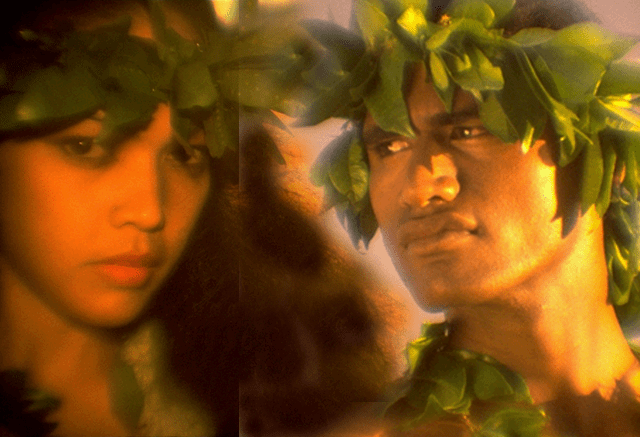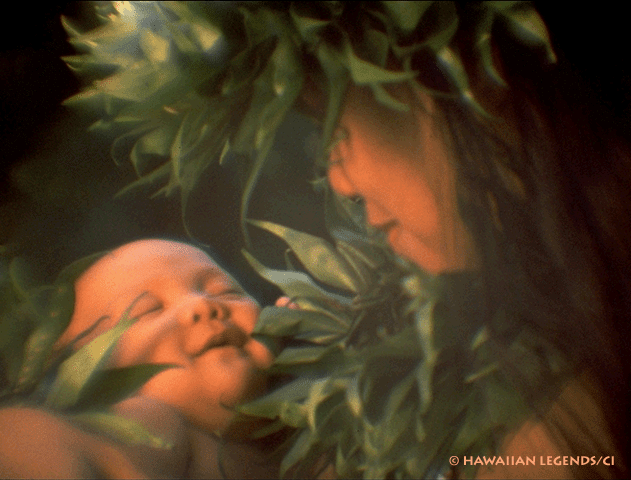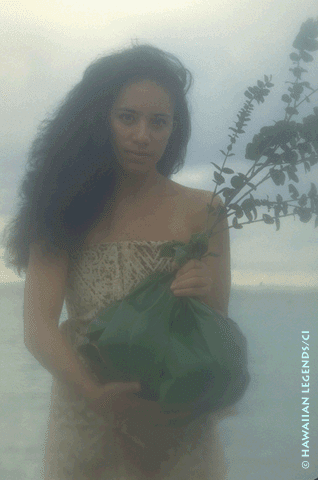Ancient Wisdom Of Priesthood
The word "priesthood" can be scary. That is because it has been attached to many forms of abuse in many different cultures for as long as humanity has recognized it as having a role to play in how men and women relate to one another. While that is a sad result of human behavior rooted in unconsciousness, it is unwise to throw the baby out with the bath water and say that the word "priesthood" is just a way for a few people to get control over the many. In fact, understood in its proper context, that word refers not to a "position" in society, but instead to a personal responsibility that each of accepts not only to ourselves, but also to everything else in our world.
Let's look at it through the eyes of the pre-Ali'i Hawai'ians known as the Mo'o. These were the people who created and lived in what was, perhaps, the most conscious culture to ever exist in our world.
The pre-Ali'i Hawai'ians -
a culture founded on a conscious vision of priesthood.
It is a little known fact that before the invasion of the Ali'i around 1,250 A.D., there was another Hawai'ian culture that had been thriving on the islands for around 1,500 years or perhaps more. Their culture was destroyed by an invasion of the Ai'i from Tahiti and Samoa.
This pre-Ali'i culture was a priesthood-based culture whose symbol was the Mo'o, a word that can refer to a small lizard, or at a deeper level, to the dragon priests whose job it is to teach people how to pass through the dragon's hot breath (overcome all fear) so they can enter into the place known as A'o, or Enlightenment.
In their way priesthood was not a "station" in life. Rather it was a personal responsibility - not held by only a few - but by every person, whether they be man, woman, or child. It was a responsibility to acknowledge the fact that each being is made out of God, for there is nothing else out of which anything can be made, and therefore each being is Divine, and worthy of the respect due a Divine being.
This idea was so important to these people, that they made it a point to make this vision of priesthood the foundation for their entire society.
The Path of the Peaceful Warrior (Personal Priesthood)
To properly understand this priesthood path, it is first important to understand the nature and meaning of an ordination to these pre-Ali'i people. An ordination is not a ceremony designed to magically make someone something they weren't before. Instead, an ordination is an opportunity for the person being ordained to formally acknowledge his/her desire to take personal responsibility for some spiritual aspect of life in front of their 'ohana/family. Each ordination is a moment of great significance, because such moments mark a time where a personal spiritual responsibility is honored as a societal responsibility as well.
This path of the Personal Priesthood is considered the "High Priesthood" in that it is of vital importance to each family. When the elements of this priesthood are lost (no matter their name) - the culture cannot long survive. The vital elements of this priesthood are integrity, self-discipline, respect for self and others as Divine beings, and love expressed as unconditionally loving service. The loss of these values happen when cultures allow moral standards derived from natural law to be replaced with moral standards based on personal convenience. Their loss has been the downfall of every great civilization throughout human history. This priesthood path insures against the loss of these values.
The First Ordination - Respect
The first ordination on life's path takes place when a child is around 8 year old, or old enough to engage in a formal program of learning - whether the teacher is a parent, a grand-parent (most often the case in Hawai'i) or some other unrelated person who has valuable skill to impart to the child. In this ordination, the child is taught to see the opportunity to get educated as a sacred gift, and to commit publicly to his/her family that he/she would respect their teacher as well as themselves by listening attentively and practicing the skills being presented. This ordination is about learning the value of respect of ALL others and their unique gifts.
The Second Ordination - Self-Discipline
The old-world Hawai'ians known as the Mo'o did not see sexual appetites as something to be ashamed of. They taught their children to see sexuality as a gift from a Loving God, capable of channeling great life energy when used properly, or great pain, when used inappropriately. This ordination was an opportunity for a person to state to his/her family the value of self-discipline in controlling one's appetites so they don't control you. This ordination is about learning the value of self-discipline.
The Third Ordination - Humility
This ordination took place when a person began to explore their gifts and talents in an effort to determine their path through life. They would ask someone who had a skill to allow them to explore that skill under their direction. The ordination presented the opportunity for the person to commit to their family that they would honestly engage the dynamic so as to discover its promise in their life. Only by giving 100% of themselves to the apprenticeship, could the person could know if that work was for them, or allow it to point them in another, more suitable direction. This ability to be patient and observant, and avoid being driven by need, was seen as a sacred life-skill. This ordination is about learning the importance of true Humility.
The Fourth Ordination - Self Reflection
Marriage is a serious priesthood responsibility in that marriage is a mirror in which we get to notice our unconscious behaviors. When those behaviors occur, what works best is to have a partner who is committed to being our friend be willing to share why such a behavior is unworthy of who we have committed to be, and what a higher behavior would look like. Learning how to communicate clearly without "make-wrong" energy is a key to this process as is learning how to accept such a mirror graciously. Ordinations the night before the wedding are the culmination of hours of training in these skills. This ordination is about learning the value of a mirror in relationship.
The Fifth Ordination - The True Nature of Love
Clearly, parenthood involves a profound spiritual responsibility to the innocent lives brought into this world. Before a child is born, the parents are instructed by the Kupuna (wise elders) of the family as well as professional Kahuna Kupua on how to avoid confusing loving with caring, and connection with attachment, so that child is able to learn that life is constructed out of choices that have consequences. Wise choces lead to life-giving consequences, and unwise choices lead to painful consequences. For a parent to keep a child from the pain associated with learning difficult life lessons is not in their highest and best interests, and therefore not loving. Before birth, each parent is taught how to raise conscious children, and this ordination represents a commitment to the 'ohana (family) to be responsible for doing so. Of note, each parent is so ordained - whether or not they are wedded. This ordination is about learning the vital difference between caring and loving.
The Sixth Ordination - Loving Service
Each person is born into this life with certain gifts and talents. Sometimes we know what we want to do from a very early age. Sometimes we don't figure it out for a long time. Apprenticeship as a youth is one of the best ways explore the many possible roads one may take through life. Eventually, each person chooses a life path and begins to develop a certain level of mastery. This mastery is not only mastery of the skill or talent, but also mastery of dealing with clients, balancing work and family time, and more. Masters serve others reliably, honestly, and with respect. In so doing they stand with others of their 'Ohana in the Circle of Life, so that all may be as abundant as possible. This ordination is about learning the value of unconditionally loving service.
The Seventh Ordination - Kupuna (Leadership)
At some point in life, the fires of experience refine knowledge into wisdom. People who are wise have a responsibility to provide loving leadership for their family. Leadership is not motivated by a desire for personal gain. Leaders must be able to be trusted to be able to make informed decisions about the health, education, and welfare of all those in their family. To do so wise elders seek out the opinions of others regarding any matter - especially from those who disagree with them - before making a decision. Once they understand the choices available, they make a decision from a place of High-Order Awareness. This ordination is about learning how to be an effective leader so balance can be created and maintained for your family.
The Eighth Ordination - Becoming an Ancestor
At some point, each of us reach that moment where it is time to make the transition known as "death." This is not the end of things, but merely a return to our "home." When we go home we do not leave behind our 'ohana (family) here, but instead, we take on the role of "ancestor". In that role we are provide loving inspiration and guidance to those we left behind sufficient to get them through any difficulty. This ordination takes place just before or after death, and is an opportunity for the person who is departing to reaffirm his/her love for their family. This ordination is about learning the fulfillment available from a lifetime of loving service.
Three Orders of Professional Priests - The Kahuna Kupua
The professional priesthood was known as the Kahuna Kupua. The word "kupua" means someone who is recognized by the family as a master teacher of something. I, Lono Ho'ala, am honored by my Hawai'ian family as well my 'ohana here, to be recognized as Kahuna Kupua A'o or Master Teacher of the Light or Enlightenment. My wife Kaikelani is honored to be recognized as Kahuna Kupua Pule, or Master Teacher of Prayer or the ability to connect with Divinity.
Kahuna Kupua live to be in service to the Personal Priesthood (Kahuna Pili) in the Circle of Life. We see that priesthood as the backbone of humanity - especially when so many people have become lost in the confusion of religion and politics. That is why the path of the Kahuna Pili is seen as the "High" priesthood and the professional priests - the Kahuna Kupua - see their role as being in unconditionally loving service to this priesthood.
The professional priesthood has three divisions named after the dimensions of spirit that make up each person. To make this more understandable, the ancient Hawai'ians gave each dimension the name attributed to their mythical folk-heros, and liked to use the metaphor of a boat to describe how these dimensions behave and interrelate.
Kahuna of the Order of Ku
Kahuna of the Order of Ku are named after the subconscious spirit in each of us that channels power. Modern psychology would call this our subconscious. It is the place in us that learns and retains patterns/programs. It is that capacity in us that "feels" things. It relates to ritual, actions, and moving energy through dance, drumming, chanting, singing or some other form of art.
In Hawai'i, if a person wants to learn the dance of hula through a master teacher, they would ask a Kahuna Kumu Hula (Master Teacher of Hula) to allow them to join their Halau (school.) Because moving energy through dancing, drumming, and chanting is so important to people, this is a vital kind of priesthood. Most masters spend their entire live's perfecting their talent for the benefit of their culture.
Kahuna of the Order of Lono
Kahuna of the Order of Lono are the professionals. In ancient days they were the healers, the canoe builders, the master fisherman and farmers, those who manipulate bodies and bones, those who assist with pregnancy and childbirth, and more. Today they are the doctors, teachers, engineers, plumbers, welders, etc. In fact, there are dozens of categories of Kahuna of the Order of Lono.
While others in the community can do these things, Kahuna of the Order of Lono are masters from whom others can not only apprentice, and learn, but from whom they can learn how to master their skills as a priest and how that mastery is given back to the Circle of Life in a spirit of loving service..
Kahuna of the Order of Kane
Kahuna of the Order of Kane are known as the "intuitionists" or those who can walk and talk with Aumakua/the Gods. These people are the examples of enlightenment. They are in charge of the Heiau (priesthood headquarters) through which all orders of the professional priests work and live.
After understanding how these people saw "priesthood" can you now begin to have a glimmer of understanding as to why they thought it so valuable that they built their society upon its foundations? Can you see the value of looking at priesthood — not as a "status" that can be used to derive power over other people — but rather as a sacred responsibility? What is the value of treating everything and every person with the dignity and respect due another Divine Being?
Is this not a vision of how to relate to one another that is sorely missing in our world today? This is not a matter of religion, it is a matter of spiritual responsibility. Too often, religion gets in the way of a personal being able to live up to that responsibility.
That is why we invite all people of good conscience to explore the opportunity of what it means to be a member of the Eagle's Nest Family and live the path of the Peaceful Warrior.
